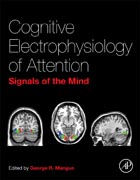
Cognitive Electrophysiology of Attention explores the fundamental mechanisms of attention and related cognitive functions from cognitive neuroscience perspectives. Attention is an essential cognitive ability that enables humans to process and act upon relevant information while ignoring distracting information, and the capacity to focus attention is at the core of mental functioning. Understanding the neural bases of human attention remains a key challenge for neuroscientists and psychologists, and is essential for translational efforts to treat attentional deficits in a variety of neurological and psychiatric disorders. Cognitive electrophysiology is at the center of a multidisciplinary approach that involves the efforts of psychologists, neuroscientists, neuropsychologists, psychiatrists, and neurologists to identify basic brain mechanisms and develop translational approaches to improve mental health. This edited volume is authored by leading investigators in the field and discusses methods focused on electrophysiological recordings in humans, including electroencephalography (EEG) and event-related potential (ERP) methods, and also incorporates evidence from functional magnetic resonance imaging (fMRI). Cognitive Electrophysiology of Attention illuminates specific models about attentional mechanisms in vision, audition, multisensory integration, memory, and semantic processing in humans. Provides an exhaustive overview of attention processes, going from normal functioning to the pathological, and using a combination of methodological toolsAn important reference for electrophysiology researchers looking at underlying attention processes rather than the methods themselvesEnables researchers across a broad range of cognitive-process and methodological specialties to stay current on particular hypotheses, findings, and methodsEdited and authored by the worldwide leaders in the field, affording the broadest, most expert coverage available INDICE: Section 1: Spatial Attention 1. Profiling the Spatial Focus of Visual Attention 2. How the Brain Prevents and Terminates Shifts of Attention 3. Neuronal and Neural-Population Mechanisms of Voluntary Visual-Spatial Attention 4. Sequential Effects in the Central Cue Posner Paradigm - On-line Bayesian Learning 5. ERP-fMRI Combination for the Study of Visual Perception and Spatial Attention 6. Source Localization of Visual Stimuli in Peripersonal Space 7. Involuntary Cross-Modal Spatial Attention Influences Visual Perception Section 2: Feature and Object Attention 8. Object-Category Processing, Perceptual Awareness, and the Role of Attention during Motion-Induced Blindness 9. Feature- and Object-Based Attention: Electrophysiological and Hemodynamic Correlates 10. Neural Mechanisms of Feature-Based Attention 11. Effects of Preparatory Attention to Non-Spatial Features in the Visual Cortex 12. The Neural Basis of Color Binding to an Attended Object 13. Switching Attention between the Local and Global Levels in Visual Objects 14. Contour Integration: Sensory, Perceptual, and Attention-Based ERP Components 15. Attentional Control of Multisensory Integration is Preserved in Aging Section 3: Attention and Cognitive Processes 16. An Evolutionary Perspective on Attentional Processes 17. Stimulus-Preceding Negativity (SPN) And Attention to Rewards 18. A Neural Measure of Item Individuation 19. Selective Attention, Processing Load, and Semantics: Insights from Human Electrophysiology 20. Altered N400 Congruity Effects in Parkinson's Disease Without Dementia 21. Oscillations and Behavior: The Role of Phase-Amplitude Coupling in Cognition
- ISBN: 978-0-12-398451-7
- Editorial: Academic Press
- Encuadernacion: Cartoné
- Páginas: 304
- Fecha Publicación: 04/11/2013
- Nº Volúmenes: 1
- Idioma: Inglés
